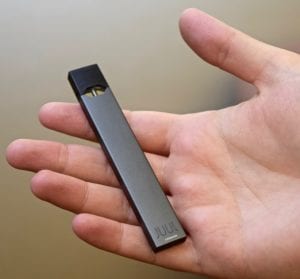Who is a member?
Our members are the local governments of Massachusetts and their elected and appointed leadership.

A Juul brand e-cigarette
In November 2019, the state updated several laws dealing with tobacco and vape (e-cigarette) sales, raising mandated fines for the sale of products to minors and raising the minimum purchase age from 18 to 21.
Many of the updates came as a result of cities and towns enacting the same policies locally — notably a policy that limits the sale of flavored tobacco and vape products. As of late 2019, 148 cities and towns had taken advantage of a federal Court of Appeals decision that supported a 2012 city ordinance in Providence, Rhode Island, to extend the 2009 federal flavored cigarette sales restriction to include all conventional tobacco and vape products.
Section 6 of Chapter 270, which for decades has been the state law that prohibits the sale of tobacco products to minors, had a minimum graduated fining scheme of $100/$200/$300. Most municipalities included this law in local tobacco control measures, often adding a tobacco sales permit suspension for repeat offenders and sometimes increasing the fine amounts.
The 2019 law raised the mandated fining scheme to $1,000/$2,000/$5,000. A subsequent Department of Public Health regulation, found at 105 CMR 665, also instituted a 36-month tolling period and provided for a local tobacco sales permit suspension where a local measure is silent on either penalty condition.
The updated state law raised the minimum legal sales age for tobacco products from 18 to 21 and followed the 26 cities and towns that had removed a sales ban exemption for menthol, mint and wintergreen flavors. (These flavors were exempted by both the federal government and the Providence ordinance.) Additionally, high-nicotine-content vape products can only be sold in adult-only retail tobacco stores and “smoking bars” (cigar bars, hookah bars, vape bars). Only “smoking bars” approved by the Massachusetts Department of Revenue are exempt from the flavor sales restriction and may allow only in-store consumption of flavored tobacco or vape products.
Tobacco product retailers received a letter from the DPH in December 2019, and dozens of local health departments reached out to tobacco and vape retailers to remind them of the new state laws, notably the higher fines.
Renewed enforcement efforts
During 2020, COVID-19 restrictions limited enforcement to answering complaints. But inspectors are now getting back into stores to conduct retailer inspections, informational visits and compliance checks.
Selling to minors under age 21 and selling prohibited flavored products — the two most frequent violations — will result in issuance of the mandated higher state fines. Municipalities deposit these fines in their general fund, with the exception of a few cities and towns that have established revolving funds that are earmarked for tobacco enforcement.
At the federal level, the U.S. Food and Drug Administration recently agreed to revisit its 2009 regulation banning the sale of flavored cigarettes. New proposed rules would remove the exemption for menthol, mint and wintergreen flavors and extend the regulation to cigars as well. (Menthol cigarettes account for one-third of all cigarettes sold nationally.)
Massachusetts law exceeds the FDA proposal, as the scope of the state policy includes all conventional tobacco products and vaping products.